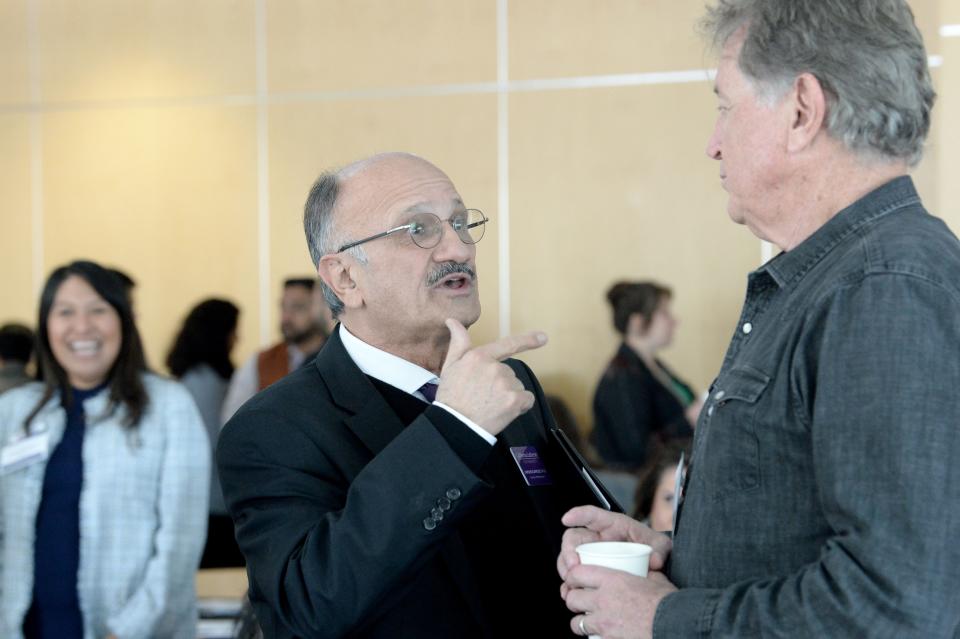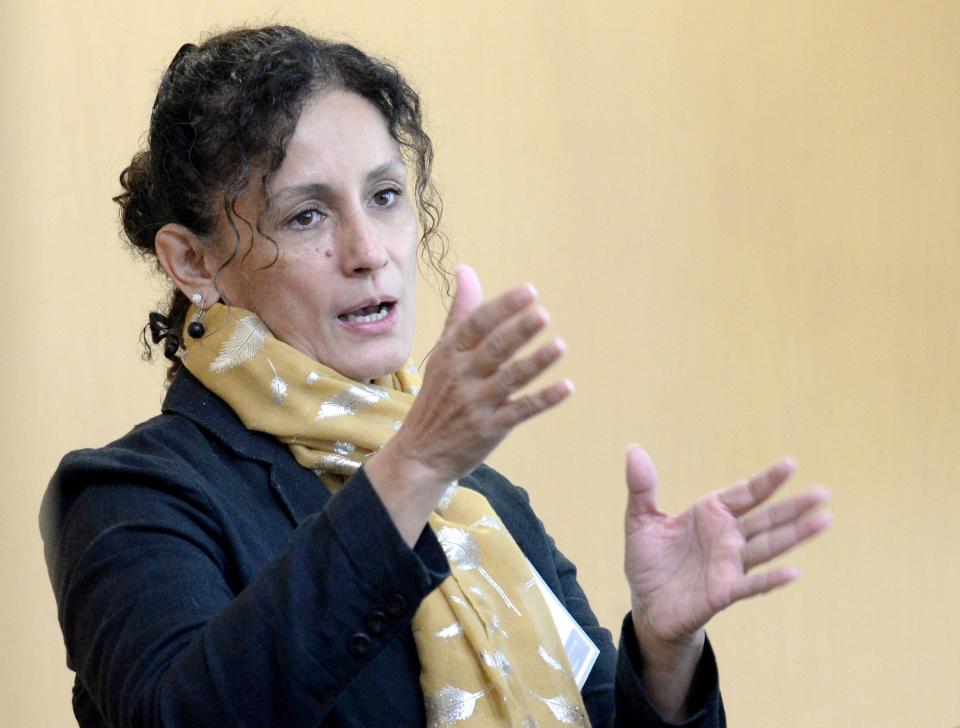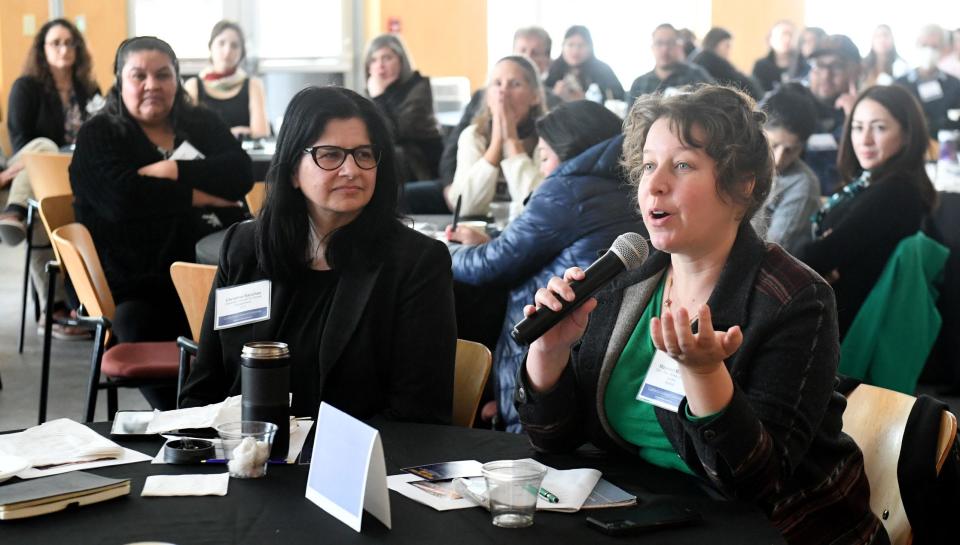California Lutheran University study aims to dispel myths about undocumented immigrants
Editor's note: This story has been edited to clarify the data on taxes paid by undocumented immigrants, their households and their employers.
Undocumented immigrants make up nearly 10% of Ventura County’s workforce and generate around $1.4 billion a year in tax payments, according to new research from California Lutheran University.
The new report by Jamshid Damooei, a professor of economics at CLU and the director of the university’s Center for Economics of Social Issues, summarizes and analyzes the available data on undocumented immigrants in both Ventura and Santa Barbara counties.
Damooei released his research Thursday at a conference at Thousand Oaks campus that also included speeches and panel discussions from researchers, activists and representatives of the agricultural industry, the biggest employer of undocumented immigrants in both counties.
There are about 60,000 undocumented immigrants in Ventura County and another 44,000 in Santa Barbara County, according to the report. That’s about 7% of the Ventura County population, but undocumented immigrants are much likelier to be of working age and employed than the general population, so they make up an outsized share of the workforce. When counting family members who are born in the U.S. or have legal immigration status, there are a total of around 83,000 Ventura County residents who are part of a household with an undocumented adult.
Because undocumented immigrants are often wary about dealing with government agencies or talking to researchers, they are “more difficult to study” than the general population, Damooei said in an email before the conference. In recent years it’s become easier, he said, thanks to research by the nonprofit Migration Policy Institute and the Equity Research Institute at USC, which maintains the California Immigrant Data Portal. Both were major resources for Damooei’s work.
“There are a lot of misconceptions and myths about what undocumented immigrants bring or don’t bring,” Damooei said at Thursday’s conference. “I wanted to do this research to bring some information where the perception is different from reality.”

Among the common misconceptions, he said: Undocumented immigrants don’t pay taxes; they only work in agriculture; and they are a largely transient or migratory population.
In fact, around 77% of undocumented immigrants in Ventura County have lived in the U.S. for 10 or more years, and 28.3% have lived in the country for 20 years or longer. They also don’t tend to return to Mexico, where the vast majority are from, as often as they used to, said Yiseel Barajas, the chief human resources officer for Reiter Affiliated, a major strawberry grower in Oxnard.
“The variety of crops that we grow in Ventura County allow for this year-round employment, and most of the farm workers live here year-round,” she said. “They’re no longer migrating like they did many years ago. The majority are permanent members of our community.”
And while agriculture is the biggest industry for undocumented workers, it still accounts for less than 40% of their jobs, with construction, manufacturing, retail and other services adding up to more jobs among them than agriculture.
In 2019, undocumented immigrants in Ventura County accounted for $569 million in federal taxes, $445 million in state taxes, and $378 million in local taxes. And they don’t get many of the benefits those taxes fund, Damooei said. For example, a worker using a fake social security number will have payroll taxes withheld but won’t be eligible for social security later in life or unemployment benefits if they lose a job.
Those estimates of total taxes paid include taxes paid by the undocumented immigrants themselves, payroll taxes paid by their employers and taxes paid by other members of their households, Damooei said in a subsequent email interview.
The taxes are only the tip of the iceberg when it comes to economic impact. Undocumented immigrants were directly responsible for $5.4 billion in economic activity in 2019, or more than 10% of the county’s total output, and also accounted for $2.8 billion in indirect impacts.
“If you hear anyone say that California or the U.S. can do what we do now without the contributions of undocumented immigrants, that is insanity,” Damooei said.

During the discussion that followed Damooei’s presentation, panelists and a keynote speaker talked about causes of undocumented immigration to the United States. The ultimate root cause, most said, is the fact that the United States has significantly higher incomes than the countries to the south.
“Mexico is not a poor country. We are in the middle,” by global standards, said the keynote speaker, Susana Cruickshank, a researcher from Mexico who studies migrant workers. But rural areas of Mexico and the countries to the south are quite poor, she said, and that drives a great deal of migration, both to northern Mexico and to the United States.
And the root cause of that poverty is a lack of opportunity and low pay, including by multinational corporations that operate in Mexico, said Alvaro de Regil Castilla, the founder of the Jus Semper Global Alliance and a Ventura County resident who once worked for some of those companies in Mexico.
“They come here because they are poor, but they are poor because of a system that makes them poor,” he said.

The panel also discussed its policy recommendations for improving the lives of immigrants and better integrating them into our economy and society. A greater supply of affordable housing was at the top of the list, along with public and private safety net programs that are open to anyone regardless of immigration status, and immigration reform that includes some kind of path toward legal status.
“You just don’t get to dream as high,” as an undocumented immigrant, said Maureen McGuire, the CEO of the Ventura County Farm Bureau. “You can’t sign contracts to start your own farming services company. You can’t buy land to start your own farm. … The industry is full of amazing entrepreneurs who act as if they own the place, but they can’t own it.”
California Lutheran has not posted the entirety of Damooei’s report yet. A slide show with some of the highlights is online at the Center for the Economics of Social Issues website.
Tony Biasotti is an investigative and watchdog reporter for the Ventura County Star. Reach him at tbiasotti@vcstar.com. This story was made possible by a grant from the Ventura County Community Foundation's Fund to Support Local Journalism.
This article originally appeared on Ventura County Star: CLU study aims to dispel myths about undocumented immigrants

